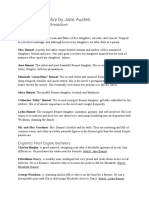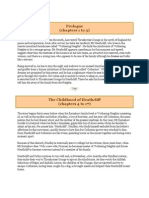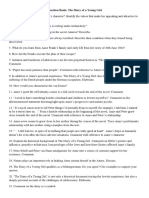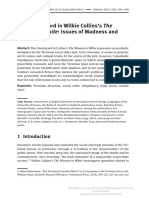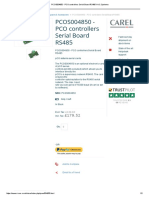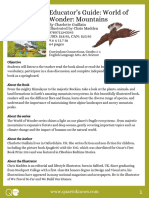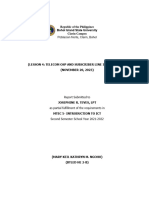Jane Austen
Jane Austen
Uploaded by
zabolotnyi61Copyright:
Available Formats
Jane Austen
Jane Austen
Uploaded by
zabolotnyi61Copyright
Available Formats
Share this document
Did you find this document useful?
Is this content inappropriate?
Copyright:
Available Formats
Jane Austen
Jane Austen
Uploaded by
zabolotnyi61Copyright:
Available Formats
54
Jane Austen (1775 1817)
(Based on the project work by Daria KRASNOVYCH)
Biography
Jane Austen was born in the village of Steventon, Hampshire in 1775, within five years of Wordsworth and Scott. She was the seventh of eight children. Her father, George, had been a Fellow of St. John's College, Oxford and lately Rector of Steventon Parish. Her mother, Cassandra, nee Leigh, came from an ancient family, linked to the Leighs of Stonehill Abbey in Warwickshire. Jane and her sister, also Cassandra, were sent to school in Oxford and Southampton, before attending the Abbey School in Reading, and were encouraged to write from an early age. Jane started writing novels in 1790, at the age of only 14, while she was living in Steventon, although her first novel to be published, Sense and Sensibility, did not appear until 1811. Although her early life appeared secure enough, it was touched by tragedy. Her cousin, Eliza Hancock, married a French nobleman, who was arrested and guillotined on his return to Paris soon after the French Revolution. Her aunt, Mrs. Leigh Perrot, was arrested when falsely accused of theft, and suffered eight months imprisonment, before she was able to prove her innocence. On her father's retirement, in 1801, the family moved to Bath. Jane's years in Bath were not happy. The family made acquaintances, but few friends. Their stay in Bath was broken up by annual excursions to the seaside: to Sidmouth, Dawlish and Lyme Regis. As was the custom, the sons of the family pursued careers (two of Jane's brothers joined the Navy), while the daughters stayed at home, awaiting marriage and involving themselves with domestic affairs. A neighbour from their Hampshire days, Harris Bigg-Wither asked Jane to marry him in the winter of 1802 but she turned down his proposal. Soon after the death of Jane's father in 1805, the family left Bath to stay with Jane's brother, Frank, who was stationed at the Naval Dockyard, in Southampton. Jane's brother, Edward, had been formally adopted by a rich and childless relative, which led to his elevation as a country gentleman. Cassandra had been sent to assist with his domestic arrangements at Godmersham Park, near Canterbury. He also owned Chawton House, Hampshire and in 1809 offered a home to his mother and sisters on the estate there. The family settled happily and it was here that Jane was to enjoy the success of the publication of her first novel. Initially, the secret of their authorship was kept, the author being referred to only as "a lady", but later, her proud brother, Henry, let it be known and she became instantly famous. Her last completed novel, Persuasion, was not published until after her death. By the time of its completion, she was seriously ill and not expected to live. During the last few weeks of her life, she lived in College Street, Winchester, to be close to her physician. She died in Cassandra's arms in Winchester at
55 the age of 41. The family exercised the right, as members of a clergyman's family, that she should be buried in Winchester Cathedral. Today, the museum at Chawton is visited by Jane Austen admirers from across the Globe. There are many mementoes of her life on display. Jane's mother and her beloved sister, Cassandra are buried in the churchyard. VOCABULARY NOTES innocence estate physician () memento - an object kept as a reminder of a person or event
Novels
Sense and Sensibility: published 1811 Pride and Prejudice: published 1813 Mansfield Park: published 1813 Emma: published 1816 Persuasion: published 1818 Northanger Abbey: published 1818. Jane Austen started to write at a time when the Romantic Movement was expressing its passionate involvement with the landscape, in particular, the melancholic aspects of gothic ruins, and the natural world in general. She was one of the few writers to adopt an irreverent attitude to this obsession. Edward Ferrars, speaking to the impressionable Marianne, in Sense and Sensibility, admits his confusion when attempting to describe a picturesque landscape and when Henry Tilney decides to lecture on the picturesque to Catherine, in Northanger Abbey, she was so hopeful a scholar that when they gained the top of Beechen Cliff, she voluntarily rejected the whole city of Bath, as unworthy to make part of a landscape". In many ways, Jane Austen's detached, ironic style was an antithesis of the Romantic ideal. Many people have commented on the modernity of her novels. Elizabeth Bowen in the English Novelists (Collins, 1946), suggests this comment is "an agreeable way of saying that she is still some distance ahead of us". She followed in the wake of the success of Fielding and Richardson and her sense of comedy and style has been likened to that of Fielding. She is noted for the precision of her observations. Her attention to detail is a means to enlighten a subject. As Elizabeth Bowen notes, "she applies big truths to little scenes". VOCABULARY NOTES irreverent detached ,
agreeable , enlighten
56
Pride and Prejudice
Pride and Prejudice is a novel of manners* by Jane Austen, first published in 1813. The story follows the main character Elizabeth Bennet as she deals with issues of manners, upbringing, morality, education, and marriage in the society of the gentry of early 19th-century England. Elizabeth is the second of five daughters of a country gentleman living near the fictional town of Meryton in Hertfordshire, near London.
*The novel of manners is a literary genre that deals with aspects of behavior, language, customs and values characteristic of a particular class of people in a specific historical context. The genre emerged during the final decades of the 18th century. The novel of manners often shows a conflict between individual aspirations or desires and the accepted social codes of behaviour.
Though the story is set at the turn of the 19th century, it retains a fascination for modern readers, continuing near the top of lists of "most loved books". It has become one of the most popular novels in English literature and receives considerable attention from literary scholars.
Plot Summary
The arrival of the wealthy Mr. Bingley to the estate of Netherfield Park causes a commotion in the nearby village of Longbourn. In the Bennet household, Mrs. Bennet is desperate to marry Bingley to one of her five daughtersJane, Elizabeth, Mary, Kitty, or Lydia. When Bingley meets Jane at a ball, he seems immediately smitten with her. Yet Bingley's snobby friend Darcy is rude to Elizabeth. Through the next few social gatherings, Jane and Bingley grow closer, while Darcy, involuntarily, finds himself becoming attracted to Elizabeth's beauty and intelligence. When Jane is caught in the rain while traveling to visit Bingley, she falls ill and must stay at Netherfield. Elizabeth comes to Netherfield to care for Jane, and though Bingley's sisters are rude and condescending to her (Caroline Bingley wants Darcy for herself), Darcy's attraction to her deepens. Elizabeth, however, continues to consider him a snob. Meanwhile, Mr. Collins, a pompous clergyman and Mr. Bennet's cousin and heir, visits the Bennets in search of a marriageable daughter. At about the same time, the Bennet sisters also meet Wickham, an army officer Elizabeth finds charming, and who claims Darcy wronged him in the past. Elizabeth's prejudice against Darcy hardens. Soon after, at a ball at Netherfield, Mrs. Bennet, much to Darcy's annoyance, comments that a wedding between Jane and Bingley is likely to soon take place. Collins, in the meantime, proposes to Elizabeth, who declines, angering her mother, but pleasing her father. Collins then proposes to Elizabeth's friend Charlotte Lucas, who accepts out of a desire for security rather than a need for love. Bingley suddenly departs for London on business, and Caroline informs Jane by letter that not only will they not be returning, but moreover her brother is planning to wed Georgiana, Darcy's sister. Jane is crushed. Elizabeth is sure Darcy and Caroline are deliberately separating Bingley and Jane. The sisters' aunt and uncle, Mr. Gardiner and Mrs. Gardiner, invite Jane to London hoping that she will get over her disappointment, but after she arrives Caroline snubs her and she regrets having met Bingley. Elizabeth visits Charlotte and Mr. Collins, where she encounters Collins' patron and Darcy's relative, the wealthy and formidable Lady Catherine. Darcy arrives and surprises Elizabeth by joining her for long intimate walks. She grows angry, however, when she learns that Darcy advised Bingley against marrying Jane. Oblivious, Darcy announces his love for her and proposes marriage. Elizabeth refuses his proposal, accusing him of ruining Jane's marriage and mistreating Wickham. In a letter Darcy explains that he intervened because he felt Jane did not truly love Bingley. Wickham, he writes, is a liar and a scoundrel. Elizabeth begins to feel she has misjudged Darcy and may have been rash in turning him down.
57 Returning home, Elizabeth finds that Lydia has become smitten with Wickham. She urges her father to intervene, but he chooses to do nothing. Elizabeth soon accompanies the Gardiners on a trip. During the trip, Elizabeth visits Pemberley, Darcy's magnificent estate. She fantasizes about being his wife there and is further impressed when he unexpectedly shows up and introduces her to his charming sister, Georgiana. Bingley also arrives and reveals that he is still in love with Jane. Elizabeth's trip is cut short by a letter from Jane announcing that Lydia has eloped with Wickham. Fearing a scandal that will ruin all the daughters' futures, the Bennets search for Lydia in London. When Mr. Gardiner tracks them down, Wickham demands his debts be paid off in return for marrying Lydia. The Bennets assume that Gardiner gives in to the demand, since Lydia and Wickham soon return, playing the happy newlyweds. (Mrs. Bennet is happy that at least one of her daughters is married.) Elizabeth soon discovers that Darcy, not Gardiner, paid off Wickham's debts, out of love for her. Bingley and Darcy return to Netherfield and Bingley finally proposes to an overjoyed Jane. While Darcy goes to London on business, Lady Catherine visits Elizabeth, warning her not to marry Darcy. Elizabeth refuses to promise. On his return, Darcy asks Elizabeth again to marry him. This time she accepts, telling him her prejudice against him had made her blind. Darcy acknowledges that his pride made him act rudely. Both couples are married and the Bennet family rejoices in their daughters' happiness. VOCABULARY NOTES prejudice - commotion pompous snub
scoundrel elope to be smitten with sb
Conclusion
Though Jane Austen wrote her books in troubled years which included wars and the French Revolution, her novels are calm pictures of society life. She understood the importance of the family in human affairs and paid little attention to the violence of the nations. The author brought the novel of family life to its highest point of perfection. Her works are untouched by the ugliness of the outside world. However, her descriptions are quite realistic as she kept the action to scenes familiar to her through her own experience, and she managed her characters with a masters touch.
Comprehension Questions
1. Were Jane Austens young years completely cloudless? 2. What made Jane Austens novels so successful? 3. Who in the novel Pride and Prejudice demonstrates pride? Who acts out of prejudice?
You might also like
- The Night Watchman LitChartDocument55 pagesThe Night Watchman LitChartchena.bou16No ratings yet
- Theme of Science in 'Dracula'Document2 pagesTheme of Science in 'Dracula'Miss_M90100% (2)
- New Historicism - The Great GatsbyDocument8 pagesNew Historicism - The Great GatsbyMuntean Lavinia100% (2)
- Pride and Prejudice by Jane Austen (Book Analysis): Detailed Summary, Analysis and Reading GuideFrom EverandPride and Prejudice by Jane Austen (Book Analysis): Detailed Summary, Analysis and Reading GuideNo ratings yet
- Pride Prejudice WorksheetDocument2 pagesPride Prejudice WorksheetAntonio GonzálezNo ratings yet
- Pride and Prejudice Basic Study Guide and BreakdownDocument6 pagesPride and Prejudice Basic Study Guide and BreakdownmeredithNo ratings yet
- Morpurgo MichaelDocument8 pagesMorpurgo Michaelzabolotnyi61No ratings yet
- William GoldingDocument17 pagesWilliam Goldingzabolotnyi61No ratings yet
- Choral and Rock-Out - Ted Huggens Wind Ensemble PDFDocument28 pagesChoral and Rock-Out - Ted Huggens Wind Ensemble PDFErcole Lattari0% (1)
- FlashForge Creator Pro Manual 20190222 Updated-ConfirmedDocument30 pagesFlashForge Creator Pro Manual 20190222 Updated-ConfirmedPhatty11No ratings yet
- Victorian AgeDocument9 pagesVictorian AgeVagif FatullayevNo ratings yet
- EMMADocument7 pagesEMMAike hasanNo ratings yet
- Jane Austen Art of CharacterizationDocument4 pagesJane Austen Art of CharacterizationSara SyedNo ratings yet
- Hamlet (Notes)Document40 pagesHamlet (Notes)VPTuitionNo ratings yet
- Questions Related To Jane AustenDocument5 pagesQuestions Related To Jane AustenAqsaNo ratings yet
- Sons and Lovers: Intr OductionDocument85 pagesSons and Lovers: Intr OductionAmmuNo ratings yet
- Atonement LitChartDocument41 pagesAtonement LitChartMegan GorringeNo ratings yet
- Emma NotesDocument19 pagesEmma NotesDaniel LuiNo ratings yet
- Cheat Sheet For English LiteratureDocument1 pageCheat Sheet For English LiteratureNancy BrooksNo ratings yet
- The Scarlet Letter NotesDocument3 pagesThe Scarlet Letter NotesLili PengNo ratings yet
- Wuthering Heights SummaryDocument3 pagesWuthering Heights SummaryMona LucaNo ratings yet
- Study Guide 3 - Lit ChartDocument13 pagesStudy Guide 3 - Lit ChartSouren KhedeshianNo ratings yet
- Emma Jane AustenDocument2 pagesEmma Jane AustenAncYiunMing100% (1)
- The Mill On The Floss Litchart-1Document50 pagesThe Mill On The Floss Litchart-1zia856666No ratings yet
- The Duchess of Malfi LitChartDocument46 pagesThe Duchess of Malfi LitChartsimplyshriyaNo ratings yet
- Frankenstein Coursework Booklet 21 22Document21 pagesFrankenstein Coursework Booklet 21 22Lizzie ShodiyaNo ratings yet
- Presented To: Dr. Archana Awasthi: A Study of Provincial LifeDocument7 pagesPresented To: Dr. Archana Awasthi: A Study of Provincial LifeJaveria MNo ratings yet
- Christina Rossetti Class NotesDocument12 pagesChristina Rossetti Class Notestangytan14No ratings yet
- Walt Whitman - The American RebelDocument5 pagesWalt Whitman - The American RebelChinar Chawla100% (1)
- Ernest Hemingway PrimerDocument18 pagesErnest Hemingway PrimerPaul Petru NedelcuNo ratings yet
- Adventures of Huckleberry Finn Literary Analysis - Leny D.Document6 pagesAdventures of Huckleberry Finn Literary Analysis - Leny D.Nolan Saenz EstorninosNo ratings yet
- Intro A YEATS en NortonDocument4 pagesIntro A YEATS en NortonocelotepecariNo ratings yet
- 1984 Quotes and Analysis Master ListDocument13 pages1984 Quotes and Analysis Master List1spotifyuserrNo ratings yet
- 9 ASP LitchartDocument10 pages9 ASP Litchartvenkata.krishnanNo ratings yet
- Fall of The House of UsherDocument6 pagesFall of The House of Usherapi-356315157No ratings yet
- Northanger AbbeyDocument16 pagesNorthanger AbbeyBapin Mallick100% (1)
- An Introduction To A House For MR Biswas PDFDocument6 pagesAn Introduction To A House For MR Biswas PDFSarba WritesNo ratings yet
- Question Bank-Diary of A Young GirlDocument2 pagesQuestion Bank-Diary of A Young GirlAyushmaan Aashish KherNo ratings yet
- T.S. Eliot BiographyDocument2 pagesT.S. Eliot BiographyWeber LiuNo ratings yet
- TheoryDocument6 pagesTheoryJahanzaib DildarNo ratings yet
- To Kill A Mockingbird Censorship and BansDocument1 pageTo Kill A Mockingbird Censorship and BansMarcusFelsmanNo ratings yet
- Inheritance of Loss Chapter SummariesDocument22 pagesInheritance of Loss Chapter SummariessammytmajongaNo ratings yet
- The Churchyard in Wilkie Collins's The Woman in White: Issues of Madness and IllegitimacyDocument20 pagesThe Churchyard in Wilkie Collins's The Woman in White: Issues of Madness and IllegitimacyRishav PaulNo ratings yet
- Psychoanalythic CriticismDocument17 pagesPsychoanalythic CriticismMuhammad Ilham AliNo ratings yet
- An Analysis of Huckleberry Finn by Mark TwainDocument5 pagesAn Analysis of Huckleberry Finn by Mark TwainUmar AlamNo ratings yet
- 20th Century Novel - Notes-2-1Document33 pages20th Century Novel - Notes-2-1Simo MijmijNo ratings yet
- "To Be Acutely Conscious Is A Disease, A Real, Honest-To-Goodness Disease." Dostoevsky, Notes From TheDocument5 pages"To Be Acutely Conscious Is A Disease, A Real, Honest-To-Goodness Disease." Dostoevsky, Notes From TheShamsNo ratings yet
- The Romantic PeriodDocument7 pagesThe Romantic PeriodPaulina CardinaleNo ratings yet
- POEMS Eliot, TS The Waste Land (1922) Analysis by 25 CriticsDocument24 pagesPOEMS Eliot, TS The Waste Land (1922) Analysis by 25 CriticsSabina QeleposhiNo ratings yet
- Postmodernism & Postmodernist Literature: ASL Literature in EnglishDocument26 pagesPostmodernism & Postmodernist Literature: ASL Literature in EnglishAman AlviNo ratings yet
- Postmodern Novels and Novelists - Literary Theory and CriticismDocument10 pagesPostmodern Novels and Novelists - Literary Theory and CriticismNUSANo ratings yet
- Marxist Overtones in Auden's Early PoetryDocument6 pagesMarxist Overtones in Auden's Early PoetryVEDA PUBLICATIONSNo ratings yet
- The Decadence of True Humanity in The Importance of Being EarnestDocument5 pagesThe Decadence of True Humanity in The Importance of Being EarnestAdilah ZabirNo ratings yet
- The Catcher in The RyeDocument3 pagesThe Catcher in The RyeHodžić NisvetaNo ratings yet
- T. SDocument23 pagesT. Skecilkan7No ratings yet
- Sonnet 73. - AnalysisDocument10 pagesSonnet 73. - AnalysisShanta PalNo ratings yet
- The Pardoner's TaleDocument7 pagesThe Pardoner's TaleEric CabreraNo ratings yet
- The Portrait of The Lady Critical AnalysisDocument8 pagesThe Portrait of The Lady Critical Analysisالمطبخ الراقيNo ratings yet
- Hazlitt On Going Journey Brief SummaryDocument6 pagesHazlitt On Going Journey Brief SummaryAastha SuranaNo ratings yet
- W.B Yeats by M RyanDocument10 pagesW.B Yeats by M RyanNewEnglishBlogNo ratings yet
- April 1, All Fools' Day: Fall Out For Laugh! I Said - Lol!Document6 pagesApril 1, All Fools' Day: Fall Out For Laugh! I Said - Lol!zabolotnyi6606No ratings yet
- Teenagers' Subcultures in Naukova Zmina: by Anastasia SHUMAN and Maria TROKOZ, Group 45-PhDocument2 pagesTeenagers' Subcultures in Naukova Zmina: by Anastasia SHUMAN and Maria TROKOZ, Group 45-Phzabolotnyi61No ratings yet
- George OrwellDocument8 pagesGeorge Orwellzabolotnyi61100% (1)
- Mahatma GandhiDocument1 pageMahatma Gandhizabolotnyi61No ratings yet
- Aid Project CompilationDocument7 pagesAid Project Compilationzabolotnyi61No ratings yet
- George Washington: Interesting FactsDocument2 pagesGeorge Washington: Interesting Factszabolotnyi61No ratings yet
- My Favorite Teacher: EDITORIAL: Our Traditional September ProjectDocument4 pagesMy Favorite Teacher: EDITORIAL: Our Traditional September Projectzabolotnyi61No ratings yet
- Humor 2012Document6 pagesHumor 2012zabolotnyi61No ratings yet
- Agatha ChristieDocument21 pagesAgatha Christiezabolotnyi61No ratings yet
- Truman Capote1Document30 pagesTruman Capote1zabolotnyi61No ratings yet
- Jack London: Slobodyanyuk AnnaDocument27 pagesJack London: Slobodyanyuk Annazabolotnyi61No ratings yet
- Herbert WellsDocument12 pagesHerbert Wellszabolotnyi61No ratings yet
- Ray BradburyDocument12 pagesRay Bradburyzabolotnyi61No ratings yet
- Jack London: Slobodyanyuk AnnaDocument27 pagesJack London: Slobodyanyuk Annazabolotnyi61No ratings yet
- Jokes Retold-2011Document10 pagesJokes Retold-2011zabolotnyi61No ratings yet
- Conan DoyleDocument16 pagesConan Doylezabolotnyi61100% (1)
- Angels' Company: Retold by Ann ATAMAS, Group 33-EDocument12 pagesAngels' Company: Retold by Ann ATAMAS, Group 33-Ezabolotnyi61No ratings yet
- Jonathan SwiftDocument34 pagesJonathan SwiftJinkyu LeeNo ratings yet
- Meeting 10 Intensive ListeningDocument4 pagesMeeting 10 Intensive ListeningFemiliana AgnesNo ratings yet
- Quorthon - Brain Damage # 2 - 1985Document2 pagesQuorthon - Brain Damage # 2 - 1985A.No ratings yet
- Pioneer DVJ-X1Document136 pagesPioneer DVJ-X1andrecaproniNo ratings yet
- The 10 As of Successful Tourism Destinations: April 2014Document5 pagesThe 10 As of Successful Tourism Destinations: April 2014Annisa Rizky AmeliaNo ratings yet
- Dedić Ramiza Presentation DocumentDocument4 pagesDedić Ramiza Presentation DocumentDzenita DedicNo ratings yet
- Ludek Pachman - Complete Chess Strategy 2 - Principles of Pawn and The CentreDocument189 pagesLudek Pachman - Complete Chess Strategy 2 - Principles of Pawn and The Centrepet1984100% (17)
- 40 Vintage PhotosDocument7 pages40 Vintage PhotosBrahim OuhammouNo ratings yet
- Classifications & Characteristics of Recreational ActivitiesDocument48 pagesClassifications & Characteristics of Recreational ActivitiesJoan MelendresNo ratings yet
- Teacher's Notes: Christopher GoldenDocument3 pagesTeacher's Notes: Christopher GoldenChristopher FryeNo ratings yet
- PCOS004850 - PCO Controllers Serial Board RS485 I-A.CDocument2 pagesPCOS004850 - PCO Controllers Serial Board RS485 I-A.CAnonymous FZs3yBHh70% (1)
- Performance List: Tiffin University ChallengeDocument13 pagesPerformance List: Tiffin University ChallengeMark DwyerNo ratings yet
- World-Of-Wonder-Mountains-Educator-GuideDocument4 pagesWorld-Of-Wonder-Mountains-Educator-GuideGenrih FligmanNo ratings yet
- World Trigger 3rd SeasonDocument5 pagesWorld Trigger 3rd SeasonDeki MalikNo ratings yet
- The Cat in The Hat Dr. SeussDocument36 pagesThe Cat in The Hat Dr. SeussBarathi BNo ratings yet
- FDMS - Future Development Management System (Full)Document11 pagesFDMS - Future Development Management System (Full)Job OteroNo ratings yet
- Marketing Management Mid-Term Assignment: Course Code: Mktg501Document7 pagesMarketing Management Mid-Term Assignment: Course Code: Mktg501Mishra SugandhaNo ratings yet
- Hs-Mini Mp3/Wma Player User Manual: SupportDocument24 pagesHs-Mini Mp3/Wma Player User Manual: SupportEnsis FalcatusNo ratings yet
- Gym RollsDocument5 pagesGym Rollsapi-307879690No ratings yet
- ACUSON Sequoia 512 Ultrasound System TransducersDocument114 pagesACUSON Sequoia 512 Ultrasound System TransducersMarcos ZanelliNo ratings yet
- N8-4-IV B.tech. I Semester (R18) RegularDocument78 pagesN8-4-IV B.tech. I Semester (R18) RegularSAI SHIVANo ratings yet
- TH 210 Play CritiquesDocument8 pagesTH 210 Play CritiquesArambh AhujaNo ratings yet
- Microproject List Ons - 22647Document1 pageMicroproject List Ons - 22647Black SingerNo ratings yet
- Lesson 4 TelecomDocument5 pagesLesson 4 TelecomJOSEPHINE TEVESNo ratings yet
- Colour of ComplexesDocument2 pagesColour of Complexeschem_chemNo ratings yet
- Sourdough Olive Bread Recipe: FoodgeekDocument1 pageSourdough Olive Bread Recipe: FoodgeekCsöngedi RichárdNo ratings yet
- Commander C300Document4 pagesCommander C300roboautomachNo ratings yet
- AS CB VII Sci RQB2Document5 pagesAS CB VII Sci RQB2Deep ManeNo ratings yet
- Hubert - Urban LadderDocument1 pageHubert - Urban LadderMartin FernandesNo ratings yet





